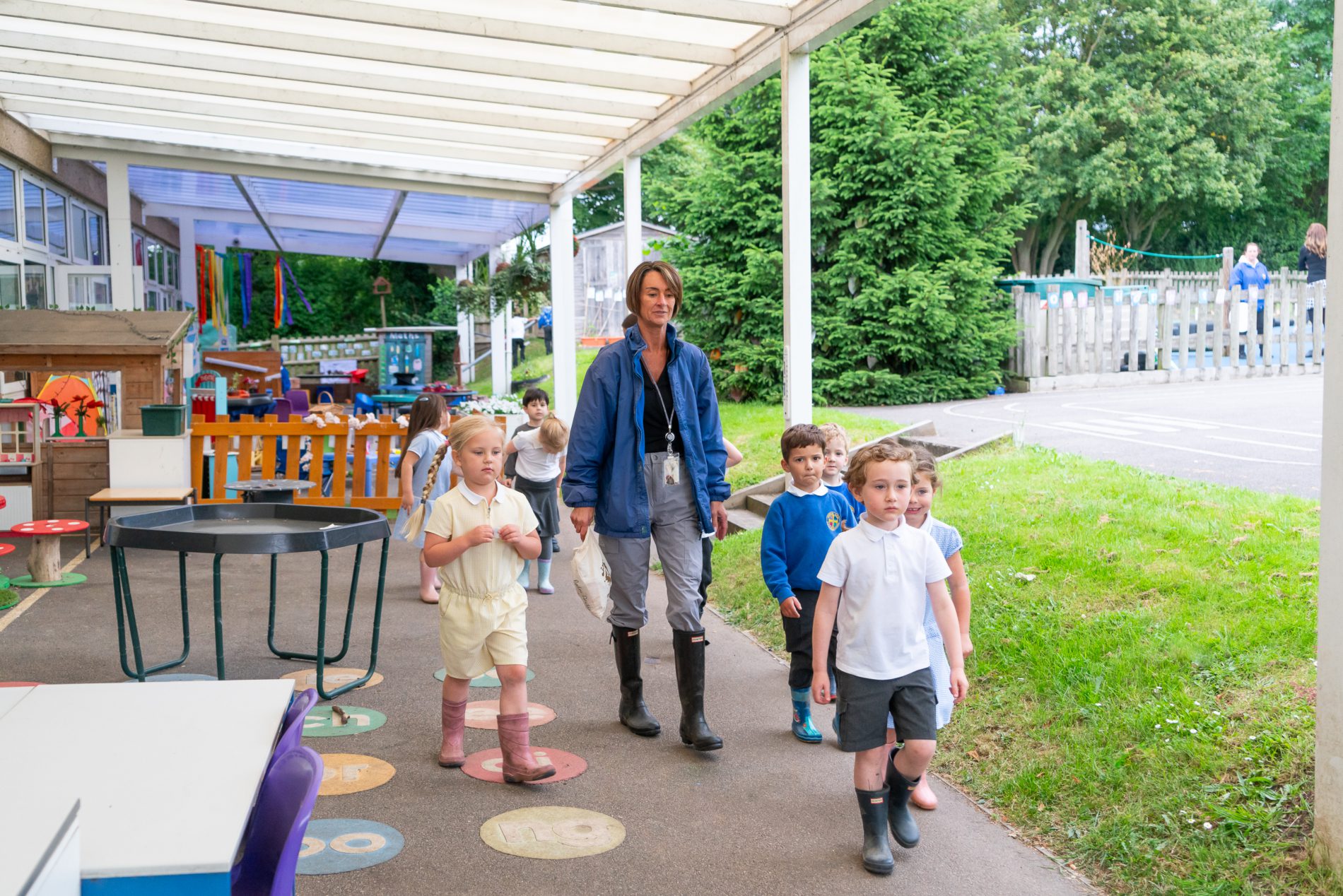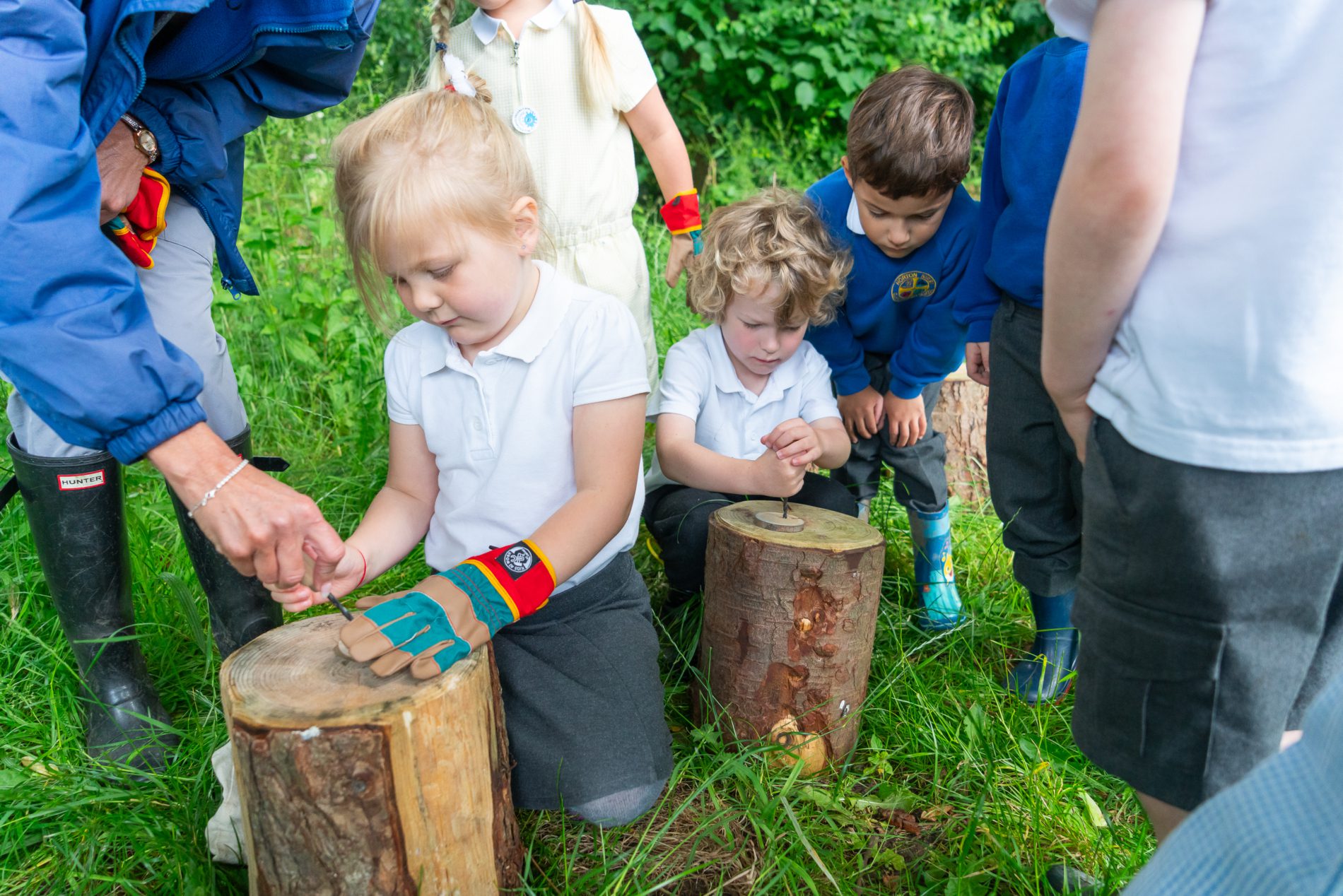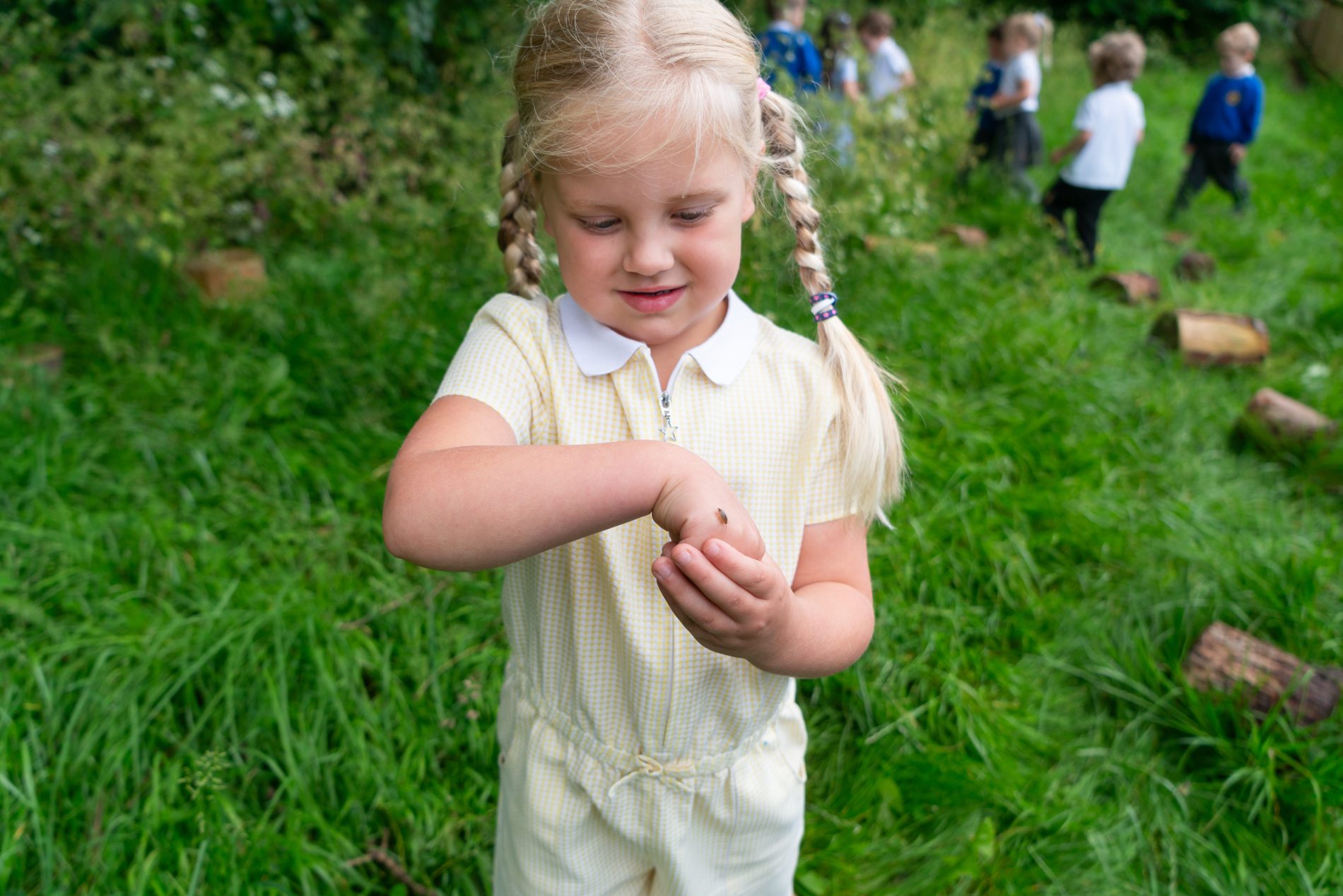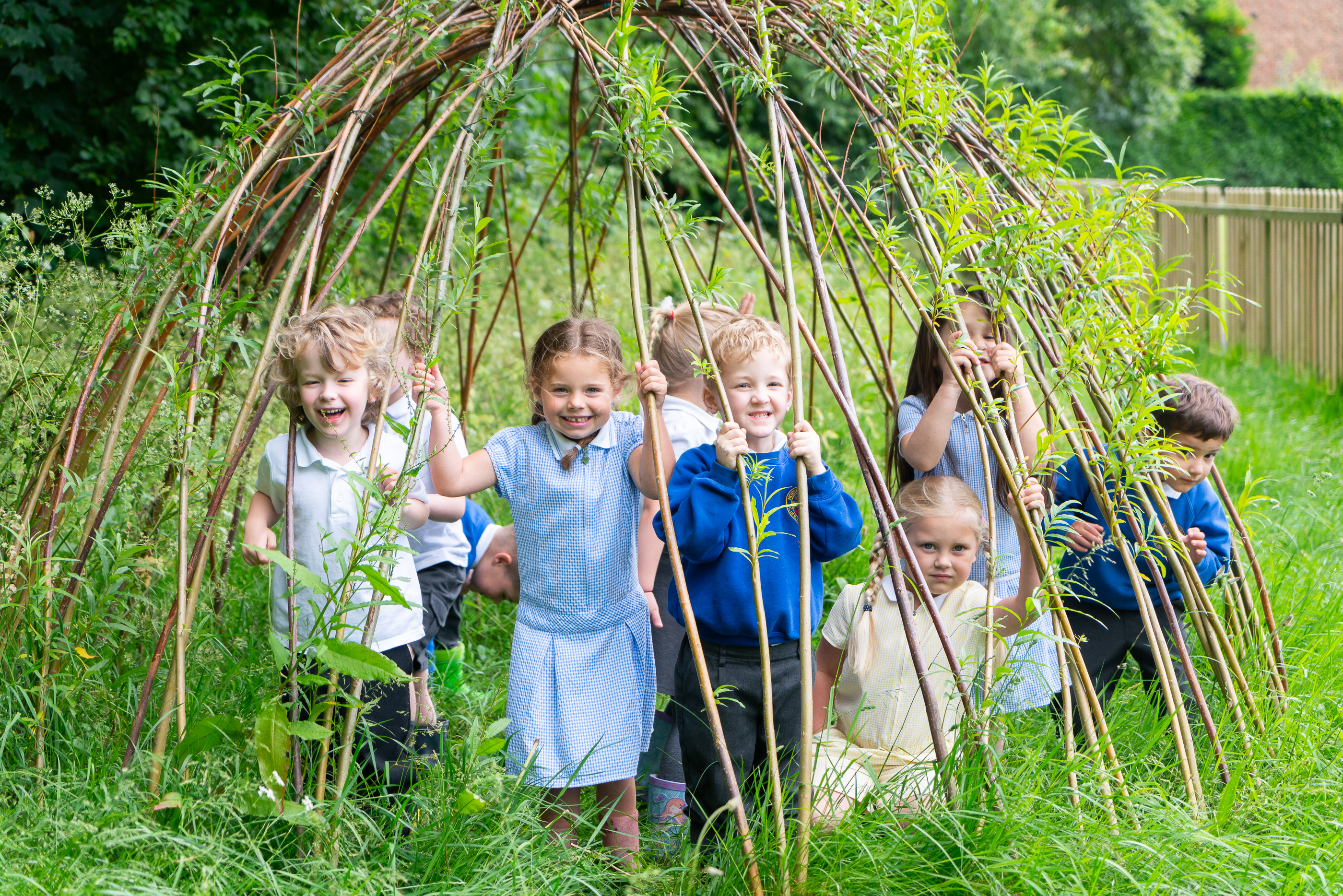Forest School Subject Leader: Mrs G Philpott
For any more information on Horton Kirby’s Forest School Curriculum, please contact the office.
Forest School helps to increase our pupil’s confidence, problem-solving and self-esteem through exploration, team building and encourages them to learn how to access and nurture the environment.
‘We respect the woodland, ourselves and each other’
Intent
It is our intention that every pupil, irrelevant of needs, develops a real passion for the great outdoors and celebrates their local, natural environment. They are given opportunities to develop knowledge, respect and passion for their local habitat and the flora and fauna therein; understanding how to look after and nurture it, as well as embracing the physical and personal challenges that working outside can present.
Through the Forest School ethos, we aim to support this philosophy by:
- Fostering the enjoyment of the great outdoors;
- Embracing and developing resilience with regard to the physical challenges that working outside can bring;
- Developing both fine and gross motor skills;
- Developing personal and social skills by working in collaboratively in pairs and teams to complete tasks;
- Developing a range of bespoke Forest School skills such as knot tying, fire lighting, lashing and whittling;
- Developing knowledge of local common flora and fauna;
- Fostering an awareness of seasonal change;
- Encouraging children to take managed risks in a supported environment;
- Developing problem-solving and resilience through practical tasks such as den building;
- Encouraging children to be active and have a healthy lifestyle;
- Encouraging pupils’ personal involvement with practical tasks enabling them to improve their attention span, persistence and commitment;
- Ensuring that the learning is matched to the differing needs of all the children as well as specific groups, such as SEND and pupil premium.
- Using our onsite woodland to contextualise learning across the whole curriculum e.g, making ‘friendship recipes and potions’, using our instructional texts we have written, mini-beast hunts in science and bringing stories to life with parents and other stakeholders.
At Horton Kirby CE Primary School, we know that children learn best when the curriculum is well-sequenced to enable revisiting of core knowledge, skills and understanding to deepen conceptual awareness before demanding application across the whole curriculum.



Implementation
All classes participate in Forest School activities. Forest School sessions happen whatever the weather – the only exemptions being strong winds and heavy snow due to safety. Forest School sessions are planned to involve a mixture of both adult-led and child-initiated activities. Adult-led tasks may involve the teaching and application of pure Forest School skills such as fire lighting, plant identification or whittling, or indeed the teaching of any area of the school curriculum which is enhanced by being in an outdoor learning environment. Child-led activities often support personal, social and emotional development or demonstrate the independent application of prior teaching and learning such as mini-beast hunting or constructing a water-tight den.
Impact
Forest School promotes the holistic development of a child.
- Physical Development—development of gross motor skills, building muscle, spatial awareness, balance, coordination and stamina. Fine Motor skills are enhanced when using hand tools as well as hand-eye coordination.
- Emotional and Mental wellbeing— spending time in woodland areas is calming and reduces stress.
- Social Development—development of communication and language skills, the ability to share, take turns and work as a team.
- Behaviour – being outside has a calming influence on the brain thereby improved behaviour is noticed.
- Self-Regulation—the ability to recognise and manage risks as well as understand the reason for boundaries and rules.
- Increased self-confidence and self-esteem— learning new skills, and taking risks when using hand tools develop a sense of responsibility and pride.
- Increased awareness, respect and understanding of the natural environment.
- Creative Development— through free play and exploration, children become naturally inquisitive of the natural environment, using it as a provocation for storytelling and role play.

Benefits of Forest School
Forest School promotes the holistic development of a child. It is particularly suited to children who struggle, for various reasons, to learn in a traditional classroom setting, as well as providing all children with a positive outlook which is then transferred to the classroom where they are found to be more motivated and have increased concentration levels.
Physical Development: Development of gross motor skills, building muscle, spatial awareness, balance, coordination and stamina. Fine Motor skills are enhanced when using hand tools as well as hand-eye coordination.
Emotional and Mental wellbeing: Spending time in woodland areas is calming and reduces stress.
Social Development: Development of communication and language skills, the ability to share, take turns and work as a team.
Behaviour: Research has shown that being outside has a calming influence on the brain, thereby improved behaviour is noticed.
Self-Regulation: The ability to recognise and manage risk as well as understand the reason for boundaries and rules.
Increased self-confidence and self-esteem: Learning new skills, and taking risks when using hand tools develops a sense of responsibility and pride. Increased knowledge, awareness, respect and understanding of the natural environment.
Creative Development: Through free play and exploration, children become naturally inquisitive of the natural environment, using it as a provocation for storytelling and role play.
Curriculum Links: The ethos and principles of Forest School support many of the Early Years Foundation Stage Curriculum and the National Curriculum for Key Stage 1 and Key Stage 2 and complement the topic-based curriculum we have at Horton Kirby.
Our Forest School Site
At Horton Kirby, Forest School sessions will take place within the school grounds. We are extremely lucky to have extensive grounds and a vast natural native woodland on site. Within our woodland, we have a wide variety of flora and fauna.
Our long-term plan is to plant hedging along the back of the playing field and allow wildflowers to grow naturally and develop a deeper diversity. Rather than set up a permanent shelter, taking into consideration the impact that regular usage will have on the natural environment and habitats, we have decided to alternate our base camp between Beech Tree Base (situated by the pedestrian entrance at the top of the playing field) and Robin’s Roost Base.
Both sites offer children the physical freedom to climb, swing, balance, explore as well as providing a wealth of natural resources to create environmental art, build shelters and dens as well as the materials used in order to develop their skills using hand tools.
SEND Information
Our SEND and disadvantaged pupils are given the necessary support in class to fully access the supported Forest School curriculum. Learning is adapted where necessary to support SEND/EAL pupils to give equal opportunities for all to be confident in approaching any problems faced. The above areas are robustly and continuously monitored to ensure any gaps in learning are addressed.

